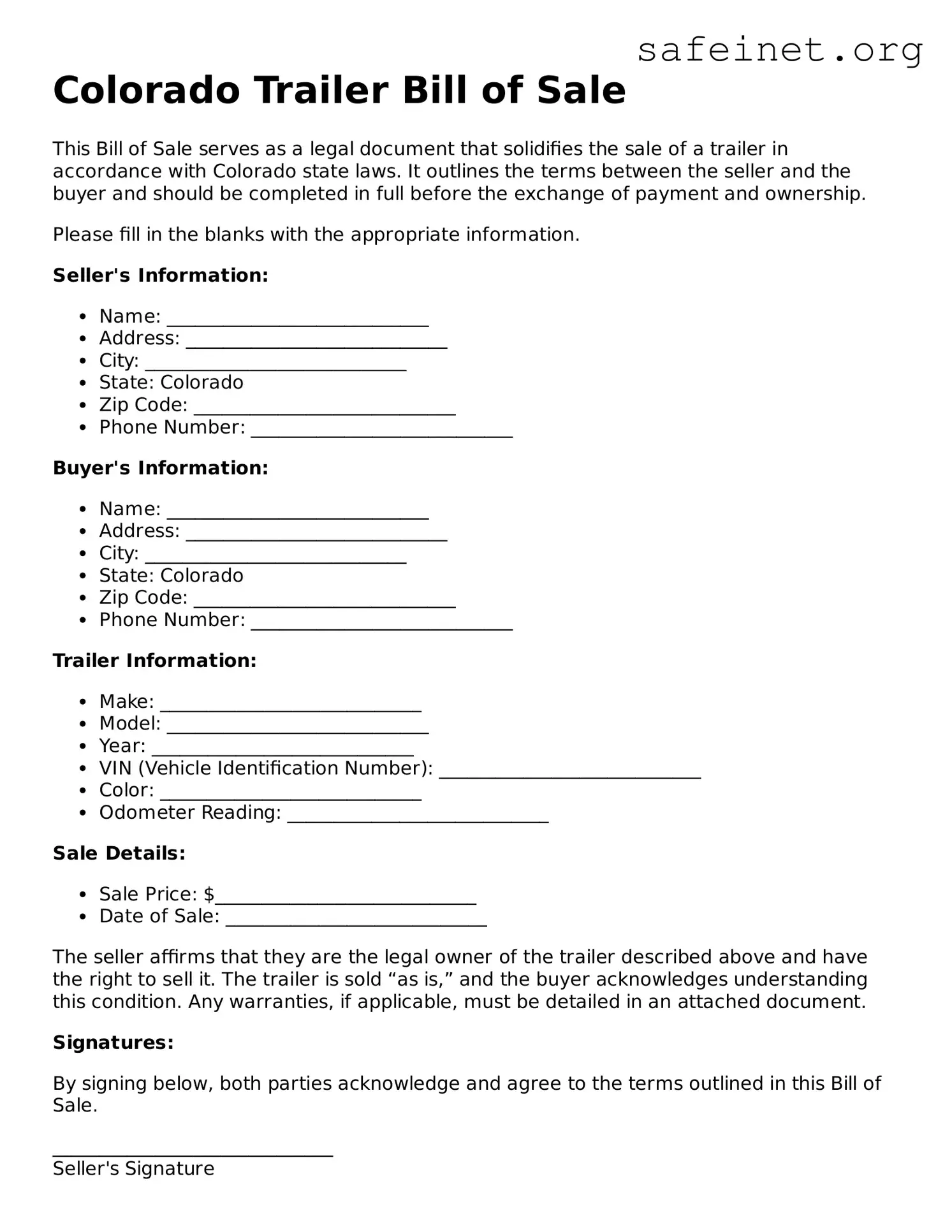The Colorado Trailer Bill of Sale is a specific document designed for the sale and transfer of ownership of a trailer. However, several other documents serve similar purposes in the realm of vehicle and property transactions. Let's explore some of them.
The Vehicle Bill of Sale is quite similar to the Trailer Bill of Sale. Both documents establish a legal agreement between a buyer and a seller, documenting the transfer of ownership. A Vehicle Bill of Sale typically includes pertinent details such as the make, model, year, and Vehicle Identification Number (VIN) of the vehicle, alongside the sales price and the parties involved. Like the Trailer Bill of Sale, this document protects both parties by providing clear evidence of the transaction.
The Boat Bill of Sale also resembles the Trailer Bill of Sale in function. When selling a boat, this document outlines essential information about the watercraft, including its make, model, length, and hull identification number. Both forms serve to record the sale and transfer of ownership, ensuring that the seller can demonstrate they no longer own the item, while the buyer has proof of purchase for registration purposes.
A Motorcycle Bill of Sale shares key characteristics with the Trailer Bill of Sale as well. This document lists the specifics of the motorcycle being sold, such as the engine number and mileage, much like the details listed for a trailer. Both documents serve to formalize the transaction legally, thus protecting the rights and interests of both the seller and buyer.
The Check List for Bill of Sale is another useful document. While it may not be a bill of sale itself, it serves as a guide for both parties to ensure all necessary information is included. This list can help sellers and buyers alike remember essential details to include, such as the description of the asset, the purchase price, and any other relevant terms of the sale, paralleling the structure of the Trailer Bill of Sale.
The Service Agreement can also be considered in the same realm. While it typically governs ongoing relationships, when associated with the sale of a trailer, it can outline any repair, maintenance, or service expectations after the sale. This ensures clarity for both parties about responsibilities post-transaction and complements the details found in the Trailer Bill of Sale.
The Power of Attorney form, though different in purpose, can relate to the transfer process. If the seller cannot be present for the transaction, this document allows another person to act on their behalf. It may include instructions for completing a Trailer Bill of Sale, thus ensuring the transaction can proceed even in the seller’s absence.
The Title Transfer form comes into play once the sale is completed. This document is crucial for updating the official records with the state, transferring the trailer's title from the seller to the buyer. While the Trailer Bill of Sale serves as proof of sale, the Title Transfer is essential for legal ownership and registration.
The Vehicle Registration form is another relevant document that follows a successful transaction. After acquiring the trailer and completing the bill of sale, the new owner must register it with the appropriate state agency. This process solidifies ownership and enables the owner to operate the trailer legally on public roads, much like the registration that follows the purchase of a vehicle.
Finally, a Donation Receipt may be similar, especially in situations where a trailer is given away instead of sold. This document serves as a record of the transfer of ownership without payment, ensuring both parties have acknowledgment of the donation. It still requires clear descriptions of the trailer, mirroring the necessities of a Trailer Bill of Sale.
